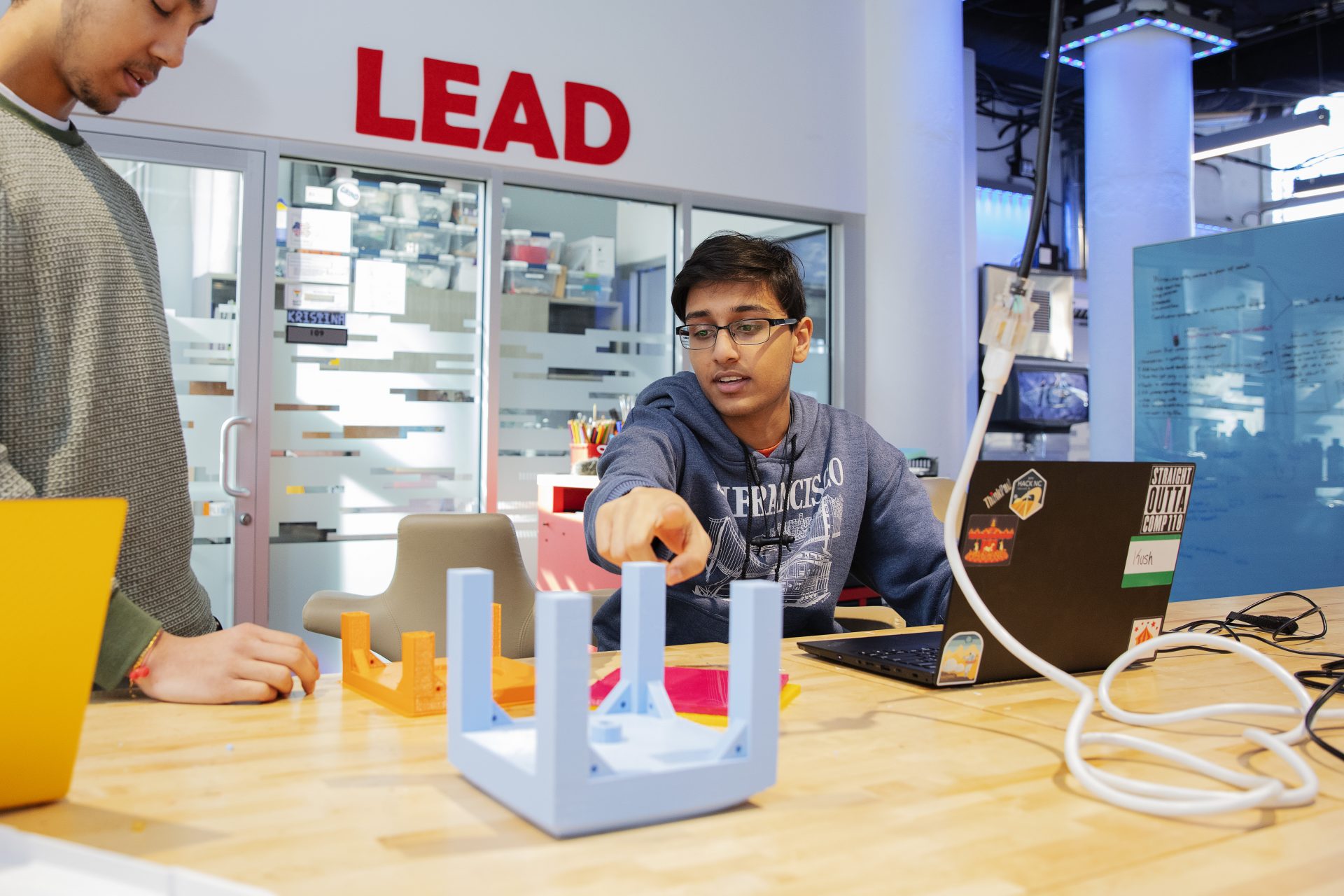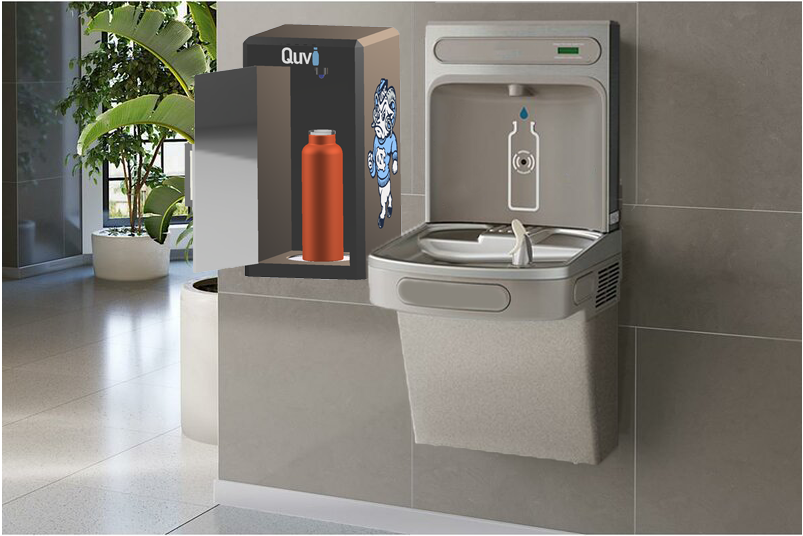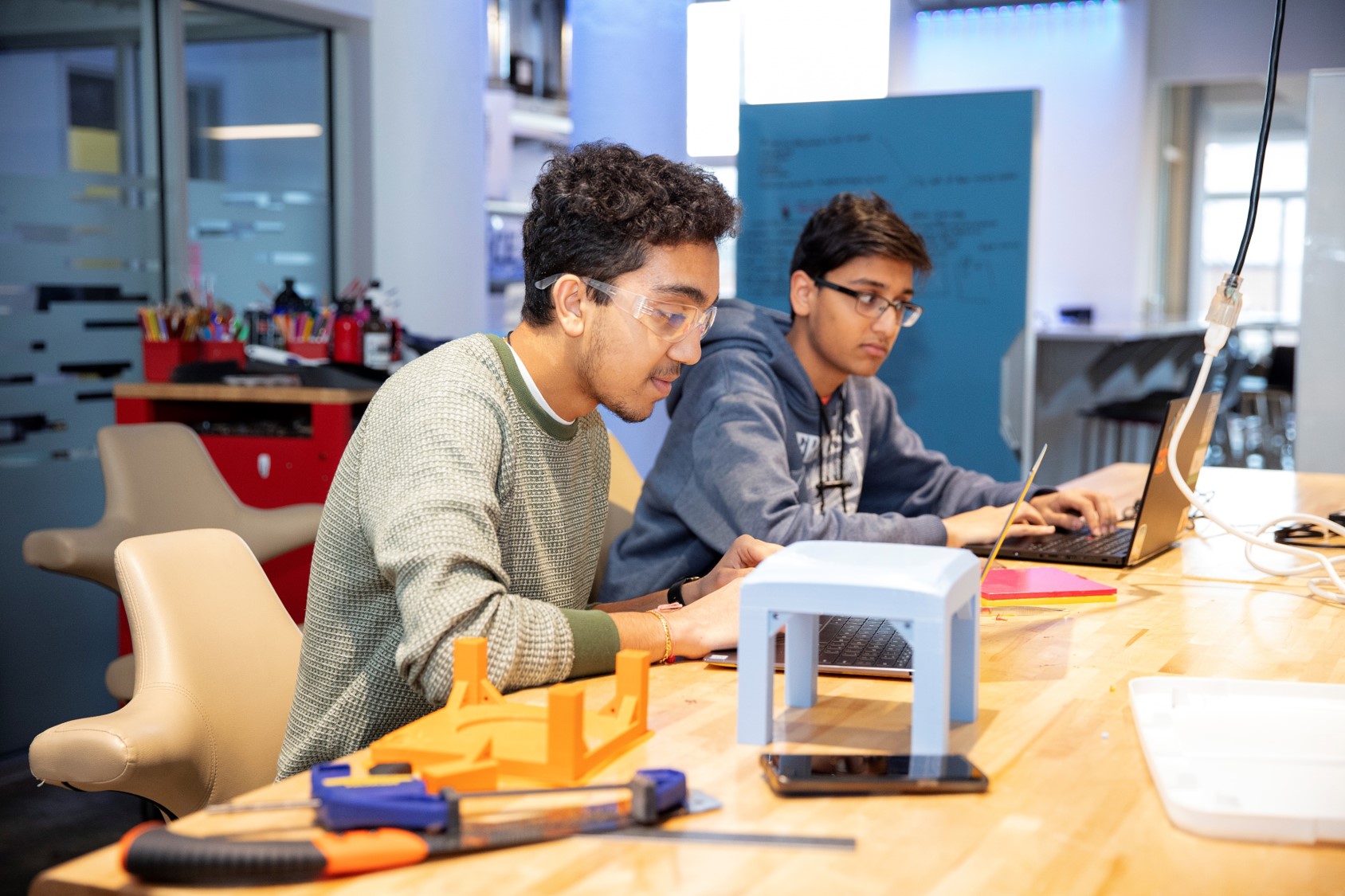

Founded by UNC-Chapel hill undergrads, startup venture QUVI is working to keep people safer and healthier with their sanitizing kiosk for reusable water bottles

Most everyone owns at least one reusable water bottle or two… or even ten. But do you know how clean your water bottle really is? That’s a question being asked by University of North Carolina at Chapel-Hill sophomores Kush Jain, Alekhya Majety and Harshul Makwana. This innovative student team is on a mission to make water bottle sanitization more accessible to students, which fueled the idea behind their startup QUVI.
QUVI is a kiosk that will use UVC light to clean the interior and exterior of any reusable water bottle in under a minute, eliminating 99.9 percent of pathogens.
The idea for QUVI was born when Makwana and Jain were freshmen roommates in 2019. The pair – who are also cousins – noticed their reusable water bottles had an unpleasant odor no matter how well they were cleaned. The cousins questioned if there was a correlation between smelly water bottles and becoming ill. Through a survey of students, they found the average student spends three-and-a-half to four days sick each semester.
“We found that sanitizing water bottles is a big problem,” says Makwana. “Many students don’t have access to dishwashers or any of the tools needed to properly sanitize. Our goal is to help solve this issue by making water bottle sanitization more accessible to people all across the world, starting with college students right here at Carolina.”
And in the midst of the COVID-19 global pandemic and on the brink of the flu and cold season, a product like QUVI is needed now more than ever. QUVI’s water bottle sanitization kiosk will allow people to put any size reusable water bottle inside the kiosk where it will be cleaned inside and out, with or without water inside.
“QUVI will get rid of bacteria pathogens and mold inside the water bottle in the water and on the outside,” says Jain. “As we continue to do testing, we’re aiming for a sanitization time of 60 to 90 seconds so students and faculty can quickly put their water bottle in right after they fill it up and have a clean water bottle in about a minute.”
In addition, the team is working on a mobile app so the entire process can be touchless, which only adds to its appeal. The team believes its solution can help reduce the spread of COVID-19 and other infectious diseases, especially on college campuses.
“While there are some products on the market that sanitize the interior of the water bottle, QUVI is the only product that sanitizes the exterior as well,” says Majety. “The QUVI kiosk is convenient, sanitizing everything all at once for users. And while it’s specialized for water bottles, we are looking at the potential for its use with everyday items, including phones or keys as well.”

Early on, the team members weren’t sure if their idea for QUVI had promise, and they looked to the Innovate Carolina Network to navigate which resources could help them most. They participated in the Carolina Challenge Pitch Party, UNC-Chapel Hill’s premier entrepreneurship competition, which helped them refine their idea.
“Our first event was the Pitch Party when we were barely an idea, and it was scary,” says Jain. “But getting that amazing feedback is what actually allowed us to evolve, adapt and get a better sense of what exactly we were creating.”
Through the 1789 student innovation community and co-working space, the team gained access to funding as well as a network of peers and mentors to continue to enhance their idea. QUVI received an award from the 1789 Student Venture Fund to help create an initial working prototype. The team also participated in Launch Chapel Hill Cohort 19, where they received $5,000 and access to mentoring, intensive programming and office space in downtown Chapel Hill.
“The most helpful part of Launch Chapel Hill was working and connecting with UNC faculty, not only to continue to develop our idea but to help with consumer interaction research and market research,” says Majety. “In the future, these connections will help us bring QUVI to UNC and eventually other college campuses.”
“The mentorship we received from Launch Chapel Hill has been really important,” adds Makwana. “As a whole, Launch Chapel Hill has been really important for our growth. It really sparked our journey.”
As part of Launch Chapel Hill, the team was exposed to the Clinton Foundation competition, where they were chosen to compete as one of 38 teams from around the globe. The competition pushed the team to do more research and consumer interaction to solidify their idea. As a result, they were able to walk away with $4,000 in funding as well as access to mentorship networking opportunities that helped expand the startup’s growth.
As the team was ready to prototype their product, they faced the challenge of finding an electrical engineer that could help create a functioning prototype. But through their budding entrepreneurial network across UNC’s campus, they were able to link up with an Adams Apprenticeship mentor, whose father happens to be an engineer at NC State University. Through that relationship, QUVI was able to get the help needed to create the functioning prototype.
“When we first started, we were afraid to share our idea with anyone for fear they would take it from us,” says Majety. “But we’ve learned that if we share our idea with others here at UNC, they are able to provide so many different connections and resources that we didn’t know were available. We learned through Launch Chapel Hill and through other UNC students that if they help us in this one area, we can help them in another area that would never have happened if we didn’t tell anyone.”


The team is in the midst of final prototype testing before it goes to consumer testing, where students will be able to interact with the kiosk and help the team finalize details such as how intuitive and effective the QUVI kiosk can be. Through it all, the trio has pushed through challenges and roadblocks along the way, crediting the University entrepreneurial ecosystem as a big influence in getting them where they are today.
“Being at UNC over the past year, I’ve learned to not be afraid to look for opportunities and make the best use of them,” says Jain. “We been able to take advantage of a lot of opportunities and events as well as great mentor programs.”
The team ultimately envisions a QUVI kiosk near water filling stations across campus, specifically in dorms and in high traffic areas where students congregate but don’t have access to a dishwasher.
“Our ideal situation would be to have at least one kiosk at UNC where we can measure if students are spending fewer sick days and are feeling more productive as a result of cleaner, reusable water bottles,” says Makwana. “We hope to eventually expand to all universities in the area and eventually go beyond North Carolina. We’re also looking at gyms as a possible place where we can put a kiosk. If we can penetrate those markets, we can better determine our success.”